Live-in care tailored to your loved one's needs
Find a trusted live-in carer to support your loved one at home, day and night.
Used by 5,000+ families across the UK
More value
On average, services facilitated by Elder are 35% cheaper than traditional alternatives.
More control
Set your care hours from our custom built app. Manage and collaborate care with family.
More choice
View carer profiles, read reviews from other families, and arrange a video/phone call ahead of placement.
More support
From our family support specialist to our in-house clinical team, we’re on hand if you need us.
More value
On average, services facilitated by Elder are 35% cheaper than traditional alternatives.
More control
Whenever and however you need it, you set the scope of your service.
More choice
Pick your favourite self-employed carer from personalised matches.
More support
Use our platform to plan and manage care from anywhere, and chat to 5* rated support teams.

We are an award-winning marketplace connecting families and carers.
Every care story is personal, and ours is no different. Our founder, Pete, was inspired to help families like yours after struggling to find the right care for his own Gran, Frances. Fast forward to today and our platform has connected thousands of families and self-employed carers. Our tools personalise every care experience, eliminate unnecessary paperwork, and empower families to take control of later life.
What is live-in care?
Live-in care is a type of home care where a dedicated carer moves into the home to provide 24-hour support. It’s a personalised alternative to a care home, helping with daily tasks like washing, dressing, taking medication, cooking, and housekeeping — all in the comfort of your own home.
Live-in carers also provide companionship, emotional reassurance and household support. From supporting mobility and running errands to being there for a friendly chat, live-in care means someone is always on hand.
Because care is tailored to the elderly’s needs and preferences, many families choose live-in care to stay independent, maintain routines, and enjoy one-to-one support in familiar surroundings.
What are the benefits of live-in care?
Live-in care offers a safe and flexible alternative to residential care, allowing people to receive full-time support in the comfort of their own home. From practical help with everyday tasks to emotional support and companionship, there are many reasons families choose this type of care.
Personalised, one-to-one support
With live-in care, your loved one receives dedicated, round-the-clock support from a single carer. This means personalised help with daily tasks, companionship, and consistent care that adapts to individual needs and routines. Whether it’s how they like their tea, support getting to the toilet, or just having someone to chat with — their preferences come first.
Independence and familiar surroundings
Live-in care enables people to remain in their own home, surrounded by the things, routines, and people they love. There’s no need to uproot their life or move them into residential care. For those living with dementia, this stability can be especially beneficial, helping reduce confusion and anxiety.
Peace of mind for families
Families often worry about how to balance safety with independence. A live-in carer provides reassurance that your loved one is safe and well cared for, while still living life on their own terms.
Flexible and cost-effective care
Live-in care can be more affordable than many people expect — and even more cost-effective than a care home. You only pay for the care you need, and local authority funding may be available. What’s more, the family home isn’t counted in financial assessments if the person receiving care is still living there.
To find out more about funding and start exploring your options, head to our guide to funding your care.
Social life and wellbeing
Being cared for at home makes it easier to stay socially active, whether that’s seeing friends, attending clubs, or going to church. Carers can accompany your loved one on trips out and help them maintain their normal social life.
Better health outcomes
Live-in care has been linked to fewer falls and hospital admissions compared to care home residents. Staying at home also means you can keep your usual GP, which research shows can lead to better long-term health. And with the right support in place, people can leave hospital sooner, reducing risks associated with long stays.
When is live-in care suitable?
Live-in care is ideal for individuals with mid to high-level care needs, especially when the level of care required surpasses what visiting care can provide. Here are some common situations where live-in care is the best option:

When visiting care is no longer sufficient
As care needs evolve over time, individuals may require more than just a few hours of support each day. For those at risk of falls, wandering, or struggling with medication management, live-in care ensures safety and provides much-needed peace of mind for families.
When adapting to a care home is difficult
Some people find it challenging to adjust to life in a care home. Those who are introverted or feel uncomfortable in communal settings may struggle with the noise, routines, and lack of flexibility. Live-in care allows them to stay in familiar surroundings while receiving the support they need.
When couples with different needs want to stay together
For couples where one partner requires care, live-in care allows both to remain together in their own home. This option provides tailored support for the person needing care, while helping lighten the load for the other partner, allowing them to maintain their daily routines and shared life.
When a person is discharged from hospital
If a person is recovering from an illness or surgery, live-in care allows them to leave the hospital sooner and recuperate in the comfort of their own home. With a dedicated carer, they can regain their independence and return to a familiar routine, away from the hospital environment.
When an elderly person have limited support from family or friends
For those with a small or distant support network, a live-in carer provides not only assistance with daily tasks but also valuable companionship. Carers can keep family members updated on important health changes and provide peace of mind when loved ones aren’t nearby.
Types of live-in care we offer
24-hour live-in care
24-hour live-in care is available for those with more advanced care needs. While standard live-in care typically involves one carer who is present but not constantly active, 24-hour live-in care involves two carers, ensuring someone is actively providing care 24/7.
Palliative care
For people facing life-limiting conditions, palliative care at home can help to ensure people living with these illnesses remain supported, comforted and cared for in their own home. It’s all about ensuring every single moment of someone’s life is maximised.
Convalescent care
Having the extra care and support needed after a surgery or hospital stay is important. Convalescent care is a short-term care solution, allowing people to receive the care they need, after illness or injury, in their own home.
Emergency care
If your primary carer becomes ill or needs to take a break at short notice, emergency home care can get the right support in place as quickly as possible – often under 24 hours.
Respite care
Respite care is where a substitute carer steps in for a limited amount of time. It allows primary caregivers to take time for themselves and their wellbeing, while helping to ensure minimal disruption in routine.
Overnight care
Overnight care can help to ensure you or your loved one is safe, comfortable and secure overnight. A live-in carer can sleep at the property during the day, and be on hand to support with anything from incontinence to providing reassurance during the night.
What do live-in carers do?
Live-in carers provide support across a wide range of daily tasks to help you maintain your independence and stay in the comfort of your own home. Here’s a list of things they can and can’t assist with:




Glucose readings via finger pricks, Injections, Pessaries, Enemas, Suppositories

Who are our live-in carers?

At Elder, we understand it can be difficult to let someone you don’t know into your home, which is why every carer on our platform must pass a suitability screening before they can connect to families. This includes a background check and character assessment. Carers are also asked to provide relevant documentation and verifiable professional references.
Only 2% of applicants are successful. It’s one of the reasons why 90% of our customers find their ideal carer the first time.
Want to learn more about some of the self-employed carers on our platform? Read their stories.
How much is live-in care?
Live-in care with Elder starts from £1150 per week (£165 per day).
As with any type of care, there are funding options available. If you haven’t already, it’s a good idea to contact your local authority and request a care needs assessment. This will determine the level of care required and whether you’re eligible for financial support.
Even if you don’t qualify for local authority funding, you might still be able to access help through benevolent funds or charities. Local carers’ groups, your GP, social worker, or health visitor can point you in the direction of available support.
For more information, read our guide to the costs of live-in care.
How can I arrange live-in care for my loved one?
Arranging live-in care involves several options, including private arrangements, using a live-in care provider, or an introductory agency. The process should always prioritise the best interests and personal circumstances of your loved one.
Initial steps: understanding the process

Arranging live-in care often begins with a care needs assessment with your loved one’s local authority to define their specific needs and determine suitable care types.
While local authorities can discuss various care options, you may need to proactively ask about live-in care if it’s your preferred choice for your loved one. If eligible for funding, you can request direct payments to your loved one’s bank account, giving them control over how funds are used.
Full live-in care funding through NHS Continuing Healthcare may also be available for those with intensive health and care needs, such as palliative care.
Exploring live-in care provider options
Once live-in care is decided upon, you will choose a provider type: arranging privately, using a managed service provider, or an introductory agency.
Arranging private live-in care
Pros: You choose your loved one’s carer (often a friend or family member) and maintain control.
Cons: You become the legal employer, responsible for holiday/sick pay, arranging respite, and managing legal obligations (DBS checks, contracts, tax, insurance).
Fully-managed live-in care providers
Pros: An easy and safe way to find a reputable, CQC-regulated provider with no legal/employment obligations for you.
Cons: It can be a lengthy process, often more expensive, and offers less choice over the specific carer. The provider shapes the care plan, offering a hands-off approach.
Introductory agencies like Elder
Pros: These agencies offer a quick and simple way to find qualified carers, as they’ve already performed necessary screening and checks. At Elder, we excel in matching carers based on your loved one’s specific needs and personality, ensuring a strong fit. We also arrange respite care whenever needed, providing peace of mind.
- Considerations: Carers are self-employed (not directly employed by the agency) and responsible for their own tax payments (though support may be available). Agencies like Elder have their own rigorous vetting processes as they are not CQC regulated. You take on a slightly more hands-on role in managing your loved one’s carer.
How to arrange live-in care with Elder
1. Share your care request
Tell us your care requirements using our request form, including the type of care you’re looking for, any specialist skills you need, and what daily life looks like.
2. Select your carer
You’ll start receiving profiles of suitable self-employed carers within 24 hours. Chat to them online or arrange a phone or video call, before choosing who you like best.
3. Manage care
Once your agreement with your carer begins, use your MyElder account to chat with them and the Elder team, manage your schedule and care information, and find respite cover if you need it.
Why choose Elder for live-in care?

A personal touch
Our technology looks at over 25 skill and personality factors to uniquely match you with suitable self-employed carers. You can view each carer’s detailed profile and chat to them directly, before choosing who you like best. And, because we know care decisions are often a family affair, our platform allows you to collaborate and work together.

We keep you in control
No one knows your family like you do – therefore decisions over how your loved one is cared for should sit with you, rather than a care company. With Elder, your agreement will be between you and your self-employed carer – together you can agree how care takes place – protecting routines, and ensuring care stays personal.

More affordable than you think
People often think home care is unaffordable. However with Elder’s service you’ll only pay for the care you need, with no hidden costs or upfront fees. Because we work exclusively with self-employed carers, our introductory services are 35% cheaper on average than managed services.
Hear from some of our live-in care customers
We love sharing stories about how our live-in care is helping people to live life on their own terms. Hear from some of our live-in care customers and find out how their live-in carers enabled them to live more independently.
“Patience is a breath of fresh air! She is lively, cheerful and fun and brings joy to my in-laws' home. Nothing is too much trouble. She makes my mother-in-law feel like a princess.”
Louise

“David has been 400% better than I could ever have imagined. I have seen many carers over the years but David is in a break away Premier league. He is attentive, thoughtful, constantly looking to improve the situation.”
Matthew
“[Our carer] never underestimated mum's sharp intellect and desire to hold on to her independence. She and mum chatted about songs mum had always enjoyed, and she helped to create a special playlist for her."
Jane

“My mother has dementia and Maria quickly gained her trust...Maria cooks her delicious meals from scratch and keeps my mother busy with new card games. I have never seen my mother so happy.”
Alice
“She was a very friendly capable caring lady. My husband thought the world of her and has asked me if he can have her care for him the next time I am away which means a lot to me.”
Elizabeth
"Marko has taken the trouble to understand Ken's complicated needs, has become a good friend for Ken and is restoring some fun to Ken's life. For that we cannot thank him enough."
Alan
“Josephine has gone above and beyond. Every Wednesday she cooks a big meal and sets the table for Alison, her son Donald and his wife Annette, which is the highlight of the week and something they all really look forward to.”
Kyla
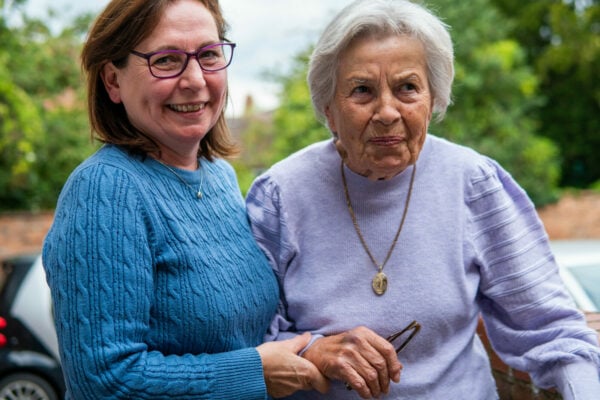
“Katie has made life easier and better for my gran from the moment she arrived. She has fitted in so well with our wee family and makes my gran feel special. ”
Angela
FAQs about live-in care
Live-in care works by having a dedicated carer move into your loved one’s home to provide one-to-one support, day and night.
Live-in carers can assist with daily tasks, personal care and companionship, helping your loved one stay safe, comfortable and independent in their own home.
Live-in carers provide support across a wide range of daily tasks to help your loved one maintain their independence and stay in the comfort of their own home. Here’s a list of things they can and can’t assist with:
Domestic duties: Live-in carers are available to help with the domestic duties around the home – from keeping a tidy house to preparing and cooking meals. They’ll support with whatever tasks your loved one finds difficult to complete on their own. Some of these domestic duties include:
Household cleaning
Laundry
Preparing meals
Running errands
Companionship
Looking after pets
Getting out and about.
Personal care: In addition to assisting with general housekeeping and domestic tasks, live-in carers assist with a variety of personal care needs. Elder-approved carers understand that accepting personal care assistance can be complex. Your loved one may feel too proud to admit they need support in this way, or worry about a loss of dignity. Therefore, carers approach all personal care scenarios with patience and understanding. Some of the personal care support offered is:
Washing and grooming
Getting dressed
Toileting
Support with mobility
Sleep and night-time support
Providing medication reminders.
It’s simple to get started. Once you’ve created your MyElder account, you’ll be asked to complete some quick clinical suitability questions and submit a ‘Care Request’. This usually takes less than 10 minutes and helps us understand your care needs to match you with the right live-in carer.
You’ll be asked about:
- The name, age, and location of the person needing care
- Any medical conditions
- Mobility levels
- Hobbies and interests
- Discrimination risk.
Using your answers, our ElderMatch technology shortlists suitable self-employed carers. You’ll typically receive profiles within 24 hours.
Each carer profile includes details about their experience, background, and feedback from other families. You’ll also see a short introductory video to help you get a feel for their personality and approach.
You can:
- Invite other family members or decision-makers to your MyElder account
- Chat directly with carers through the platform
- Arrange phone or video calls to get to know them better.
Not sure what to ask a potential carer? We’ve put together some helpful questions. Once you’ve found the right carer for your needs, simply click ‘Accept’ on their profile to move forward. For more advice, read our guide to how to choose a live-in carer.
We know how important it is to feel confident in the carer supporting your loved one. That’s why every self-employed carer on the Elder platform must pass a suitability screening before joining. This includes:
- Professional care experience – Carers must have previous experience in a professional setting, such as a private home, care home, or healthcare facility. We don’t accept personal or family-only care experience.
- Strong communication skills – A good level of written and spoken English is essential.
- Proof of identity – Carers must provide valid photo ID and have the Right to Work in the UK.
- Background checks – All carers must be eligible to pass an enhanced DBS check (England and Wales).
- References – Carers are required to supply at least two verifiable professional references.
- Screening assessments – Each carer completes a series of situational judgment and character assessments to help us understand their approach to care.
Yes, you can arrange care with more than one self-employed carer through Elder. For example, if you need separate carers for daytime and nighttime support, simply submit a separate Care Request for each arrangement.
Be sure to clearly outline the specific needs each carer will be supporting with, so we can match you with the most suitable individuals for each role.
Thanks to our nationwide network of self-employed carers, we’re often able to arrange live-in care within 24 hours. In urgent cases, we’ve even matched families with a suitable carer on the same day.
Yes, absolutely. If you or your loved one has a preference for a male or female carer, just let us know when submitting your care request.
Yes. All self-employed carers on our platform are required to have a good standard of written and spoken English to ensure clear communication and high-quality care.
If you’d prefer a carer who also speaks another language, just let us know — we’ll do our best to match you with someone who meets your needs.
Yes. To help the live-in carer settle in and feel comfortable, you’ll need to provide:
- A private room – Ideally a bedroom that isn’t used by other family members or as a walkthrough. If a bedroom isn’t available, a spare reception room or study can be adapted, as long as it’s a private and quiet space.
- Access to a bathroom – The carer doesn’t need their own bathroom, but clean, functional facilities are essential. If the bathroom is shared, there should be space for the carer to store personal toiletries.
- WiFi access – A reliable internet connection helps carers stay in touch with Elder, access care resources, and communicate with family, especially important in rural areas with poor phone signals.
Live-in carers usually prepare and share meals with the person they’re supporting, so there’s no need for separate dining arrangements. We recommend budgeting around £40 per week to cover the cost of the carer’s food. If you prefer, this can be included in your weekly payments through Elder.
Some carers may have specific dietary requirements and may choose to buy their own food instead. We suggest discussing food preferences and arrangements directly with your chosen carer to ensure a setup that works for everyone.
Self-employed carers will usually work 8-12 hours per day.
Yes, self-employed live-in carers can assist with occasional night-time support, such as helping with bathroom visits or offering reassurance if your loved one wakes up feeling confused or disoriented.
Typically, carers assist with night-time disturbances up to twice per night, for an average of 15 minutes per occurrence. If your loved one requires more frequent or intensive night-time support, such as ongoing care through the night, you may need to consider alternative arrangements like waking night care.
It’s important to ensure your carer gets enough rest to provide quality care during the day, so they will generally not exceed the average night-time support unless they are specifically arranged as a waking night carer.
For more information, visit our quick guide for customers.
Self-employed live-in carers can assist with light household tasks as part of their daily duties. These may include:
- Wiping down surfaces
- Vacuuming and mopping floors
- Emptying rubbish bins
- Laundry and changing bed linens.
However, self-employed carers are not professional cleaners, so deep-cleaning tasks (e.g. carpet cleaning, window washing, or specialised cleaning) are not part of their responsibilities. It’s recommended to arrange for a professional cleaning service for more thorough cleaning or specific needs.
Before the carer begins, it’s important to discuss and agree on the household cleaning expectations to ensure both parties are aligned.
When your live-in carer needs time off, you can easily arrange for a self-employed respite carer through Elder. Here’s how the process works:
- Discuss the time off – Work with your carer to agree on when they will take their break.
- Book time off – Your carer will schedule their time off through the ElderHub, our platform for carers.
- Advertise the dates – Once booked, the time off is automatically listed on ElderHub, allowing other carers to apply to cover the period.
- Choose a replacement carer – You can review applicants and select a suitable respite carer using the same process you used to choose your original carer through MyElder.
- Smooth handover – Your primary carer will receive the details of the respite carer so they can discuss your loved one’s care needs and ensure a smooth transition.
If you prefer to make private arrangements or have a family member step in during this time, simply let us know so we can pause your care schedule and ensure you are not invoiced for this period.
Yes, live-in care can be especially beneficial for individuals living with dementia. Staying in familiar surroundings helps reduce confusion and distress. Carers can provide dedicated support tailored to your loved one’s needs and routines. Read our guide to live-in dementia care for more information.
If the match isn’t right, we will offer a replacement carer at no extra cost. Simply give us a call and we’ll work quickly to present you with new carer matches, usually within 24 hours.
Absolutely. You can ask about their motivation, training, past experience, approach to emergencies, and how they build relationships with those they care for.


